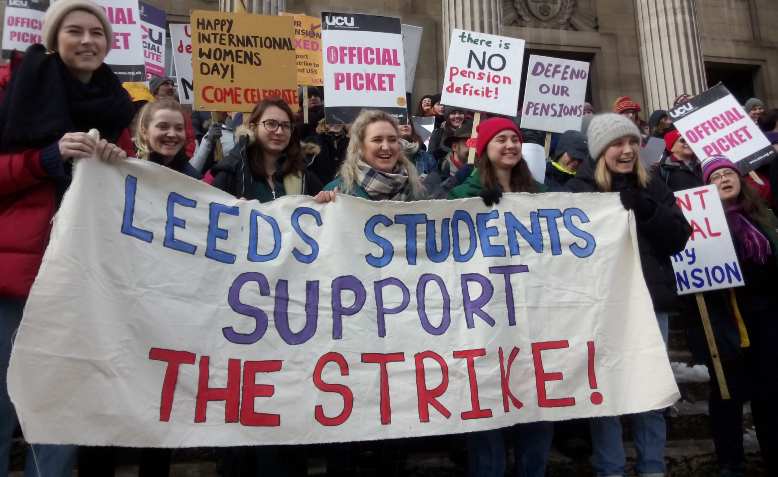 Leeds students supporting UCU strike, 2018. Photo: Alarichall / Wikimedia Commons / CC BY-SA 4.0, license linked at bottom of article
Leeds students supporting UCU strike, 2018. Photo: Alarichall / Wikimedia Commons / CC BY-SA 4.0, license linked at bottom of article
With the mounting crisis in universities over rising Covid cases, students and lecturers must agitate together for safe learning, argues Lucy Nichols
More than 50 universities across the country have reported cases of Covid-19. In Northumbria, over 700 students have tested positive. The University of Manchester reports having around 221 cases, though students largely agree that the real number is far higher, with no university-wide test and trace system to accurately convey case numbers.
Fallowfield – the Manchester suburb that houses tens of thousands of students, largely from the University of Manchester – is now a Coronavirus red-zone, with the highest concentration of positive cases anywhere in the country. One parent described the ward as ‘Covid Soup’.
There have been lockdowns in the student halls at Manchester Metropolitan, Glasgow, Bournemouth, Exeter and countless other Universities.
Students report not having access to food, laundry services or mental health support.
Still, Universities are insisting on teaching some classes face-to-face, and most students won’t be able to move home without incurring a huge financial blow.
At the beginning of September, the government was insistent on sending students to Universities despite steadily increasing cases of Covid-19 and more and more local lockdowns.
What began as isolated incidents (at Glasgow and Manchester Met) has quickly descended into a nation-wide disaster.
The UCU and NUS have began a campaign to delay face-to-face teaching until it is absolutely safe to do so, and many rank-and-file UCU members have called for a closure of campuses. The University of Liverpool branch of the UCU is now in a dispute with employers and is opposing working on campus. Various other UCU branches do not seem far off from taking similar steps.
Meanwhile, students are growing increasingly incensed. In Glasgow, organising at the Glasgow University Solidarity Collective, students have been fighting for rent strikes. A protest was called on October 2 in solidarity with freshers locked down in Manchester Met.
The key now is for students to begin to organise both within the NUS and beyond it. Demands must continue to be made for an end to face-to-face teaching, a rent strike must be organised, and tuition fees must be waivered. Access to mental health services must be made available for all students, and the physical and mental health of students and staff should be prioritised.
Solidarity between students and staff is also key. Although students have historically been supportive of striking lecturers, it may be harder for many students to accept an end to on-campus learning – especially considering that the £9,250 tuition fee still stands, despite a lack of access to learning resources such as libraries and labs.
This is why we must continue to make the case for an outcome that favours working people (whether learner or teacher), and the government and universities must, for once, put people before profit.
Join Revolution! May Day weekender in London
The world is changing fast. From tariffs and trade wars to the continuing genocide in Gaza to Starmer’s austerity 2.0.
Revolution! on Saturday 3 – Sunday 4 May brings together leading activists and authors to discuss the key questions of the moment and chart a strategy for the left.

